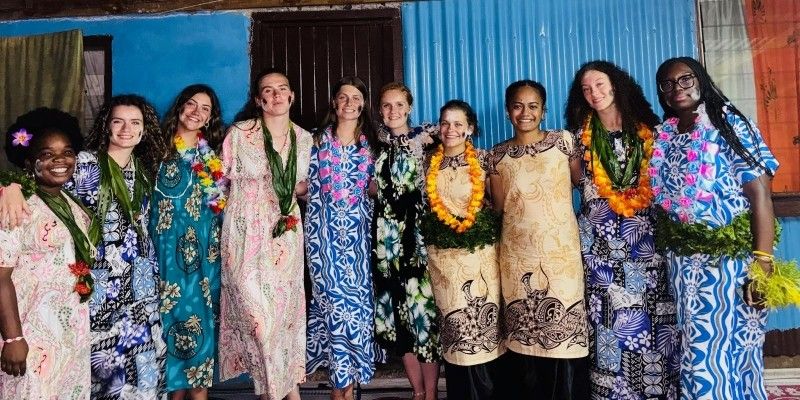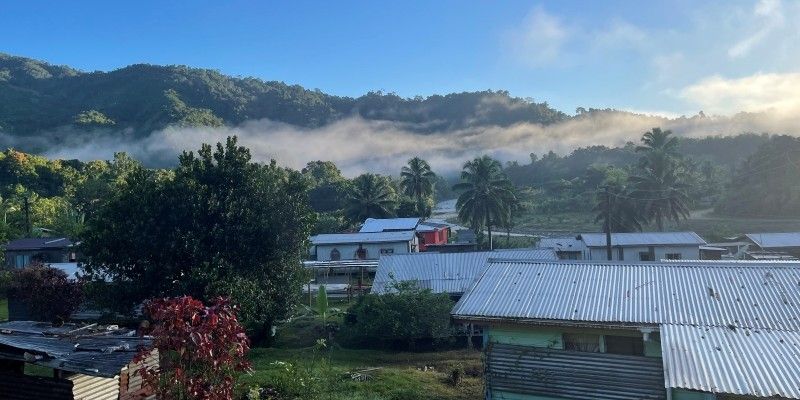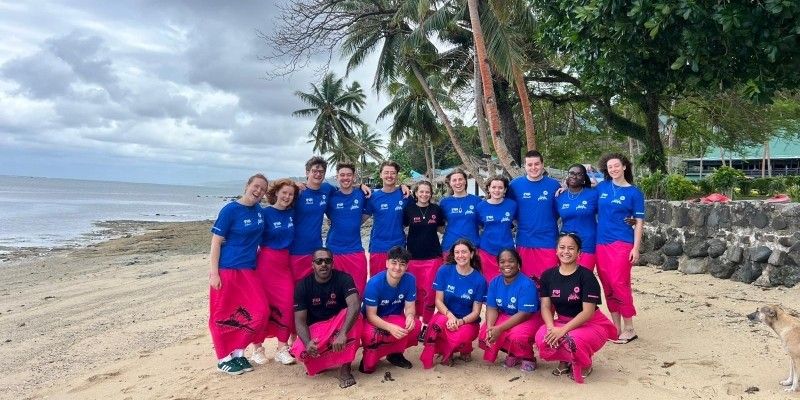
Student volunteers on a sustainable development project in Fiji have described how the experience taught them valuable career skills.
The Think Pacific programme is a social enterprise and international charity, co-founded by a University of Leeds alum in 2009.
Current students from the University joined a volunteer expedition in partnership with the Fijian government, holding climate workshops and living with families in local villages.
The Youth Empowerment project covered areas including mental health, environment and climate, sport development, business and enterprise and physical health.
Diversity is really important, we can learn so much from speaking to people from different backgrounds.
Lauren Baker, a fourth-year student studying Psychology, took a year in industry during the third year of her degree to work in the clinical and health psychology department at St James’s University Hospital in Leeds. Lauren said that this work experience is where she developed a passion for the importance and relevance of inclusive practice and learning.
“During my placement year I was able to develop presentation and public speaking skills, which really helped when facilitating the workshops over in Fiji,” said Lauren. “In my first workshop I was nervous about having to present to a small village but by the end my confidence grew, I was leading parts on my own and I felt comfortable.
“In Fiji I was able to explore different cultural perspectives on mental health and seeing the way cross cultural collaboration enriches learning and outcomes was an extremely valuable experience for me.
“I led a workshop on self-care strategies and one of the Fijian mums who attended the workshop now implements them into her daily routine. I was deeply moved to see this impact. Diversity is really important, we can learn so much from speaking to people from different backgrounds.”
Henry German, a third-year student studying Sustainability and Environmental Management, helped with the environment and climate and business and enterprise workshops, which linked to his studies and aligned with the United Nations Sustainable Development Goals.
He also ran a debate on environment and climate, asking the group to debate the question about responsibility of climate change. The group were split into two, with one group debating the argument from the villagers and the other from the government’s perspective.
“This experience had a profound impact; it was great to see the group understanding the topic more and they were really enthusiastic even with the difficulty of the language barrier,” said Henry.
“By equipping people with knowledge and power this has a profound social impact, which will help my CV.”
Henry stayed with a local farmer in the village of Waibasaga. To reach the village, which is located in the middle of the rainforest, the team had to cross a river, which came up to waist height following heavy rainfall.
Henry and his fellow students who took part in the programme are planning to raise funds for a bridge to access the village.
Seeing this instant impact of climate change affecting people’s lives was a moving experience for Henry. Due to increased rain in the country the villagers cannot cross the river, meaning children cannot get to school and villagers are not able to get into the city to trade.
Educating villagers about climate change has helped to pass on knowledge to young people about why these issues are happening.
Lauren added: “It was amazing living with a family, I definitely underestimated how much of a big aspect to the programme this was. It helped me to grow in confidence and appreciate the little things. My host family were so welcoming.”

Looking to the future
Lauren would like to go into a career in clinical psychology in the future. She said: “I really enjoy volunteering and would like to take part in another similar experience, specifically with mental health, in order to give back to communities because it is such a nice feeling.
“I would like to look at doing a cultural exchange with vocational impact, which involves going into psychiatric hospitals and shadowing experienced psychologists. My experience in Fiji has definitely given me the confidence to pursue this for many reasons, such as developing adaptability, cultural sensitivity and confidence in new environments.
“Immersing myself in a different culture in Fiji taught me how valuable it is to approach mental health from different perspectives and to understand how social and cultural contexts influence wellbeing.”
This opportunity was supported by the Turing Scheme and the University of Leeds Footsteps Fund. Henry said without the funding this opportunity would not have been possible.
He added: “The project really opened my mind to different areas of sustainability that I could go into in the future. I’m now really interested in a future career within social sustainability and the international scope of this area.
“I would like to look into doing an internship or work experience in this area as I have really gained a lot from this experience, I feel I have made an impact. Seeing the group at the start and watching them develop confidence, speaking skills and improving their English was fantastic.
“It has also helped me with my third year as I would like to focus my dissertation on volunteering and looking at what people in a country are capable of doing themselves.”

Global opportunities
Harry Hunter, co-founder of Think Pacific, studied BA Modern History from 2004-2007 at the University of Leeds. During the first year of his degree, Harry met co-founder of the business Simon Darker, who studied at Leeds Beckett University. Both Harry and Simon had previously travelled to Fiji and bonded over their shared passion for community based projects overseas.
The duo joined the University of Leeds SPARK business startup programme, which is where Think Pacific originated. From there, Think Pacific had success in the University of Leeds and Yorkshire business plan competitions and began programmes in Fiji in 2009.
Harry said: “The SPARK team were incredible; they gave us advice and guidance about our business plan and proposal. SPARK were able to connect us to their network and community, and the business grew from their belief in us.”
Think Pacific remains connected with the University project base and the team work with global opportunities in over 100 universities across the world including Australia and New Zealand.
The business continues to grow, with a Bali programme launched last year and Thailand launched this year. Following the success of the business model for immersive experiential learning with local partners and communities, Harry and the team are focusing on regenerative travel to redefine what travel can be.
Brian Baillie, Head of Business Start Up, Incubation and Student Enterprise in SPARK at the University of Leeds, said: “Harry and Simon have been tremendous supporters of Spark over the years, and we are really proud of what they have achieved. They give a lot back to the University too – supporting our young entrepreneurs and passing on their sound advice and tips.
“It is great to see the University supporting Think Pacific and other SPARK alumni businesses. They are wonderful examples of SPARK ambassadors, and we wish them every success moving forwards.”
Further information
For more information, please contact Rebecca Hurrey at r.hurrey@leeds.ac.uk in the University of Leeds press office.
Main image: The students with the villagers before a Meke, a traditional dance in Fiji.
Image credits: Lauren Baker and Henry German.